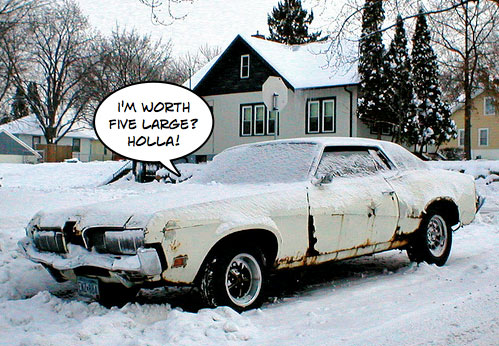By Eric Peters
May 9, 2024
There is more incentive than ever to "cling" to your "clunker" - as almost anything that's old and paid-for is derisively styled by the people trying to shame-push you into a new car payment - and all that goes along for the ride. Including the surveillance/data-monitoring/driver-controlling "technology" (they always use that word to impart a kind of sophisticated mouth feel to electronics that infantilize).
But what about the disincentives?
Yes, there are some. But - for the most part - they are overhyped, like the cases! the cases! were during the "pandemic." And for similar reasons. The chief one being to scare you into doing what they want you to do. In the case of cars, it's to get you out of your paid-for "clunker" and into a new car payment. And also into paying more in taxes and insurance. It (everything) is almost always at bottom about money - and extracting more from you for the sake of them.
But what about those Big Repair Bills? The ones those who want to get you into paying regular bills - every month, for however many years they get you to agree to pay them - use to scare you into agreeing to pay on the regular... as opposed to the occasional? It is quite something that some people feel less uneasy about being chained to regular/serial payments for years than accepting the chance they might have to pay for a repair every now and then.
But then, many of the people who've bought into this paradigm don't have the money available to pay for the occasional repair every now and then. Probably on account of their having agreed to make so many regular/serial payments instead.
But what about those Big Repair Bills? The ones those who want to get you into paying regular bills - every month, for however many years they get you to agree to pay them - use to scare you into agreeing to pay on the regular... as opposed to the occasional? It is quite something that some people feel less uneasy about being chained to regular/serial payments for years than accepting the chance they might have to pay for a repair every now and then.
But then, many of the people who've bought into this paradigm don't have the money available to pay for the occasional repair every now and then. Probably on account of their having agreed to make so many regular/serial payments instead.
5-Minute Core Exercise... Buy New $19.99
But - as they say - do the math. And some thinking to go along with it. If you sign up to pay $400 each month for a new car - a very modest monthly payment these days, but just for the sake of discussion - that means you have to come up with $400 every month to make those payments. This means you have $400 less each month available to pay for anything else. Not including what you are probably paying more for to insure the new car.
You have bought "peace of mind" - against the worry that you may have to pay for an unexpected repair. The new car car being new and warranted, so that if a repair is needed, it will be covered by the warranty - as if the latter didn't cost you something.
On the other hand, if you did not have to pay $400 each month, then each month that passes without having to pay for a repair is $400 more you have available in the event the car you have - your "old clunker" - needs a repair. If you don't spend that money on something else (another common mistake that backs people into the corner wherein the new car loan seems more "affordable" than paying for an unexpected repair that can't be financed except by putting it on a credit card at usurious interest) then after just one year, you will have nearly $5,000 in cash available to pay for any repairs that come up unexpectedly.
That is enough to pay for even Big Repairs - the ones they bogeyman up to scare you into making payments on the regular. It is enough, in most cases, to pay for a new transmission in the event your "old clunker" needs one. More than enough to pay for Big repairs such as timing belt replacements.
And the big thing here is that - likelier than not - you probably won't have to pay for any of that this year. Eventually, yes. A Big Repair will one day rear its head. This is inevitable and as much a part of owning a car as eventually needing to replace the roof or some other such thing is an inevitable part of owning a home, if you own it long enough.
But the odds are ever in your favor - per the Hunger Games - that Big Repairs will be few and far in between. During those in-between times is when you save the money that you'll then have available to pay for repairs that for the most part won't be big ones. In our $400/month example, after 72 months - the duration of a typical new car loan and payments on the regular during that time - you will have not paid close to $30,000 just in principal and not counting interest nor what you would have spent on insuring and paying the various taxes on a new car.
That sum will more than cover any Big Repair.
Of course, you will probably not be able to save the whole nearly $30,000 because it's almost certain you will have to spend money on this or that - i.e., whatever work the "old clunker" you're driving - needs during that time. But it is unlikely you'll have spent even half the $30,000 on repairs during that time whereas had you bought into the payments on the regular, at the end of seven years, you'd have spent every cent of that nearly $30,000 - and the kicker is that at that point, you'll be holding the keys and title to an "old clunker" that will need repairs - which you probably haven"t got the cash to pay for, having spent it all on regular payments.
There is an asterisk to this.
If your old car is a rusty old car then it may actually be a clunker. In italics to reflect the actuality as opposed to the hyperbole.

Not superficially rusty - that being purely cosmetic and of no functional relevance. A "clunker" is no less reliable if it has a few rust bubbles in the sheetmetal. But if anything structural - like the frame - is structurally compromised by rust, then it is probably time to cut bait and buy a replacement.
Which you'll probably be able to afford - if you haven't been making payments on the regular.
